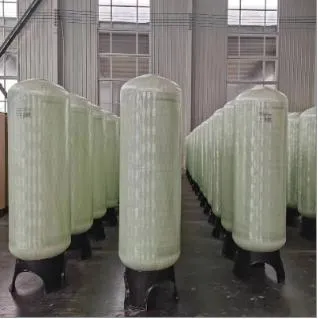loading...
- No. 9, Xingyuan South Street, Dongwaihuan Road, Zaoqiang County, Hengshui, Hebei, China
- admin@zjcomposites.com
- +86 15097380338
- Welcome to visit our website!
The Role Of Frp Pressure Vessels In The Industrial Sector
With the rapid development of modern industry, innovation and application of engineering materials have become an important driving force for industrial progress. Among them, FRP pressure vessels, as a new type of material used in pressure equipment, are gradually playing an increasingly important role in various industrial fields due to their excellent physical properties and chemical stability.

FRP pressure vessels have superior corrosion resistance, which is one of the main reasons why they stand out in many industrial applications
Traditional metal materials often face serious corrosion and fatigue problems when facing corrosive media such as strong acids and alkalis, leading to a shortened service life. The resin matrix of fiberglass can effectively resist chemical corrosion, ensuring long-term stability in harsh environments. This makes FRP pressure tanks an ideal storage and transportation medium for industries such as chemical, food, and pharmaceutical.
FRP pressure vessels have a relatively light self weight
Compared with similar metal containers, FRP pressure vessel filters are often much lighter in weight, which not only reduces transportation and installation costs, but also lowers the requirements for supporting structures, providing more flexibility in design and construction. In addition, the lighter structure not only reduces the burden on equipment, but also provides convenience for the automation and mechanization of industrial processes.
The flexibility demonstrated by FRP pressure vessels in manufacturing processes is also one of the important reasons for their widespread application
The forming process of fiberglass has diversity, and containers of various shapes and sizes can be manufactured according to demand to meet the specific needs of different industrial occasions. Through advanced mold design and production processes, fiberglass pressure vessels can also achieve complex structural design, which is particularly important for applications with limited space or special functional requirements.
The strength and rigidity of FRP pressure vessels cannot be ignored
The strength of modern FRP pressure vessel tank materials has been continuously improved, which can meet or even exceed the bearing capacity of some traditional metal materials. This enables fiberglass containers to operate safely and reliably in applications that require high pressure and high temperature. This characteristic makes it not only widely applicable in low-pressure environments, but also adaptable to more demanding industrial conditions.
In summary, FRP pressure vessel tanks are gradually occupying a place in the industrial field due to their excellent corrosion resistance, lightweight structure, flexible manufacturing process, and outstanding strength performance. In the future, with the further development of materials science, it is expected that fiberglass pressure vessels will demonstrate their unique advantages in more fields, promoting industrial modernization to a higher level.
-
The Rise of FRP Profiles: Strong, Lightweight, and Built to LastNewsJul.14,2025
-
SMC Panel Tanks: A Modern Water Storage Solution for All EnvironmentsNewsJul.14,2025
-
GRP Grating: A Modern Solution for Safe and Durable Access SystemsNewsJul.14,2025
-
Galvanized Steel Water Tanks: Durable, Reliable, and Ready for UseNewsJul.14,2025
-
FRP Mini Mesh Grating: The Safer, Smarter Flooring SolutionNewsJul.14,2025
-
Exploring FRP Vessels: Durable Solutions for Modern Fluid HandlingNewsJul.14,2025
-
GRP Structures: The Future of Lightweight, High-Performance EngineeringNewsJun.20,2025
